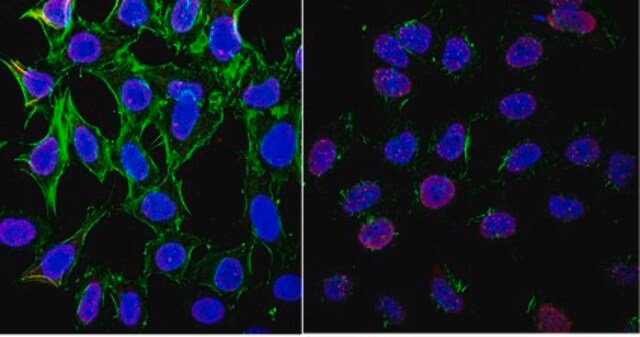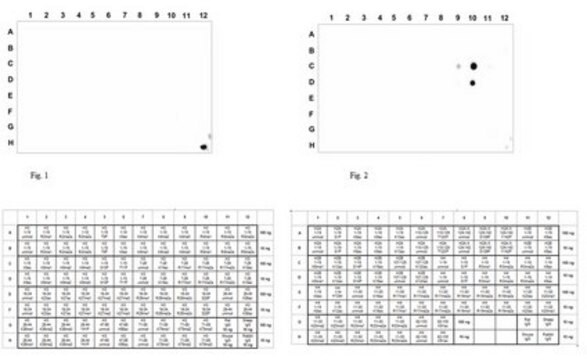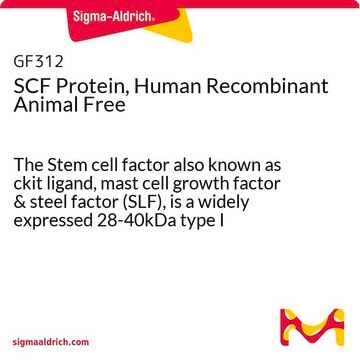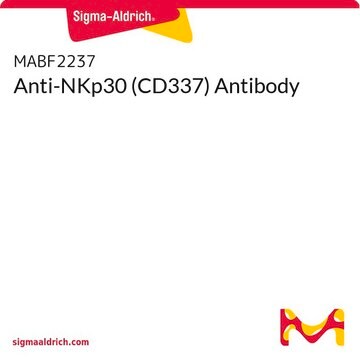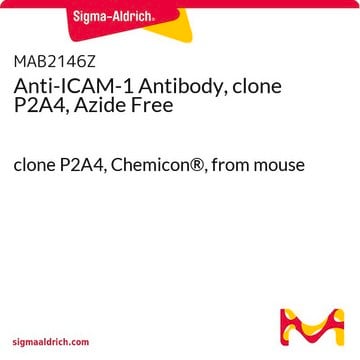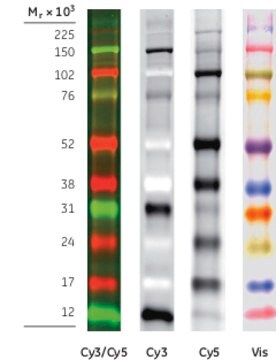MABF946
Anti-H-2K Antibody, clone Y-3
clone Y-3, from mouse
Synonym(s):
H-2 class I histocompatibility antigen, K-B alpha chain, H-2K, H-2K(B), H-2K(K), H-2K(Q), H-2K(R), H-2K(S), Beta-2-microglobulin
About This Item
Recommended Products
biological source
mouse
Quality Level
antibody form
purified immunoglobulin
antibody product type
primary antibodies
clone
Y-3, monoclonal
species reactivity
mouse
technique(s)
affinity binding assay: suitable
flow cytometry: suitable
immunocytochemistry: suitable
immunoprecipitation (IP): suitable
isotype
IgG2bκ
NCBI accession no.
General description
Specificity
Immunogen
Application
Affinity Binding Assay: A representative lot reacted with cell surface murine class I MHC H-2K haplotypes b, k, q, r, s, but not d, in affinity binding assays utilizing 125I-labelled antibody. Clone Y-3 exhibited similar affinity toward seven H-2Kb mutant strains as the wild-type strain (Hämmerling, G.J., et al. (1982). Proc. Natl. Acad. Sci. U. S. A. 79(15):4737-4741).
Flow Cytometry Analysis: A representative lot detected the surface expression of exogenously transfected H-2Kb Y84C mutant among TAP- and tapasin-deficient BL/6 fibroblasts, while little exogenously expressed wild-type H-2Kb was detected on the cell surface in the absence of either TAP or the TAP-binding protein tapasin (Wijeyesakere, S.J., et al. (2015). Proc. Natl. Acad. Sci. U. S. A. 112(41):E5608-5617).
Flow Cytometry Analysis: Clone Y-3 ascites fluid detected an induciton of cell surface H-2K immunoreactivity upon exogenous murine calreticulin (mCRT) expression in the CRT-deficient K42 mouse fibroblast line (Del Cid, N., et al. (2010). J. Biol. Chem. 285(7):4520-4535).
Immunocytochemistry Analysis: A representative lot detected the surface expression of exogenously transfected H-2Kb Y84C mutant among TAP- and tapasin-deficient BL/6 fibroblasts, while exogenously expressed wild-type H-2Kb remained intracelluar in the absence of either TAP or the TAP-binding protein tapasin (Wijeyesakere, S.J., et al. (2015). Proc. Natl. Acad. Sci. U. S. A. 112(41):E5608-5617).
Immunoprecipitation Analysis: A representative lot immunoprecipitated H2-K from a calreticulin-/CRT-deficient mouse embryonic fibroblast (MEF) line transfected to express murine CRT (Wijeyesakere, S.J., et al. (2015). Proc. Natl. Acad. Sci. U. S. A. 112(41):E5608-5617).
Quality
Flow Cytometry Analysis: 0.1 µg of this antibody detected H-2K immunoreactivity on the surface of one million C57BL/6 mouse splenocytes (H-2 haplotype b).
Target description
Physical form
Other Notes
Not finding the right product?
Try our Product Selector Tool.
Storage Class
12 - Non Combustible Liquids
wgk_germany
WGK 2
flash_point_f
Not applicable
flash_point_c
Not applicable
Certificates of Analysis (COA)
Search for Certificates of Analysis (COA) by entering the products Lot/Batch Number. Lot and Batch Numbers can be found on a product’s label following the words ‘Lot’ or ‘Batch’.
Already Own This Product?
Find documentation for the products that you have recently purchased in the Document Library.
Our team of scientists has experience in all areas of research including Life Science, Material Science, Chemical Synthesis, Chromatography, Analytical and many others.
Contact Technical Service
